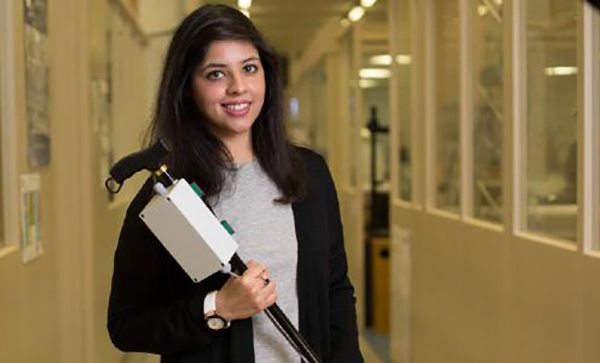
Neha Chaudhary, a 24 year old Pakistani has invented an award winning smart walking stick for people suffering from Parkinson’s disease. Intrigued by this invention, the Muslim Science team approached Neha to gain more insight on this new invention.
The idea of “Walk to Beat” walking stick initially struck Neha when she saw her grandfather suffering from Parkinson’s for nearly eight years. After witnessing the Parkinson’s freeze herself, she aimed to help patients who suffer from this disease.
Parkinson’s disease refers to a neurological disorder which particularly affects movement in the body and is more common among the elderly. It affects a person’s ability to walk, eat, write and speak. This state has come to be known as a Parkinson’s freeze – a sudden temporary episode of complete immobility. It not only limits the ability to start movement but also hampers an ongoing rhythmic activity such as walking or speaking. The brief pause in walking is very disabling as it gives the sensation of being glued to the ground. During this Parkinson’s freeze, there is a high probability that patients might injure themselves if they continue to stand for too long.
By conducting research, Neha found a simple solution to remedy this particular aspect of the illness. Neha developed this idea as her final year research project during her Bachelor’s degree at the University of the West of England. She made an initial prototype of the walking stick which she incubated at the Bristol Robotics Laboratory. The structure of the walking stick operates using haptic vibrations; the handle of the stick is equipped with a device that gives a vibrating pulse like sensation to the person holding the stick serving as an impulse to continue movement. The rhythmic pulse allows patients to match the pace of their movement with the beating. She also incorporated a recording sensor in the stick that will record the time and duration of the freezing episode based on their walking patterns. Neha believes this is an important modification which will help doctors and health care professionals to better understand the disease and its implications on their patients.
Neha tested the walking stick with Parkinson’s patients making changes over the course of one year based on patients’ feedback. She wanted to develop a product which was not only effective but also aesthetically pleasing to reflect the needs of the patients. This battery operated walking stick has is rechargeable and once fully charged, it operates for 5 days. Each product has a life span of five years.
Neha has received widespread positive feedback on this invention. As a result of this, she went on to found her own company “Walk to Beat” under which she began developing this product further. Neha and her team are continuously making efforts to improve this product and develop a minimum viable product by November 2017, aiming to launch the complete product by early next year. Neha is currently doing her Master’s in Marketing at the University of the West of England, polishing her skills to reach a wider market audience. Her invention has won three awards for entrepreneurship and five prizes including 100,000 pounds worth of investment to produce and develop this walking stick.
Farid Dailami, Associate Professor for Knowledge Exchange in Manufacturing at the Robotics Innovation Facility remarked: “The Walk to Beat walking stick can make a real difference to the lives of people suffering from Parkinson’s, and we are looking forward to providing further support and helping realize its potential.”
References:
http://parkinsonslife.eu/parkinsons-walking-stick-neha-chaudhry-walk-to-beat/
https://info.uwe.ac.uk/news/uwenews/news.aspx?id=3360
http://parkinsonslife.eu/walk-to-beat-innovative-walking-stick-parkinsons-patients-neha-shahid-chaudhry/